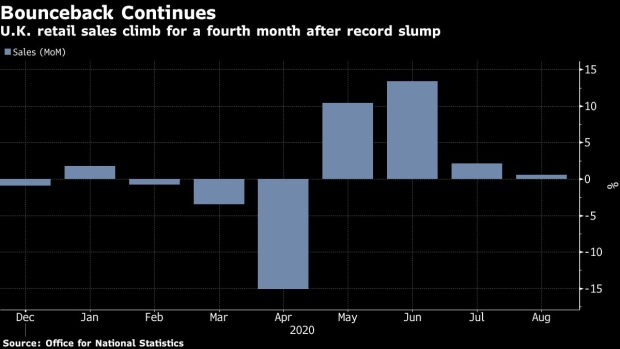Sep 18, 2020
U.K. Retail Sales Continue Rebound
, Bloomberg News

(Bloomberg) -- U.K. retail sales extended their recovery in August as a government initiative to boost the hospitality industry lured locked-down Britons out to the shops.The volume of goods sold in stores and online rose 0.8% from July, the Office for National Statistics said Friday. It marked a fourth month of growth following an unprecedented slump in April, when the government ordered most stores to close to help fight the spread of coronavirus. Sales excluding auto fuel rose 0.6%, stronger than economists forecast.
The figures may boost hopes that consumer spending -– the engine of the British economy -- is bouncing back strongly. Sales volumes are now at record levels and 4% above their pre-pandemic levels. Non-essential stores were allowed to reopen in June.
August saw millions of Britons take advantage of government-subsidized meals under the Eat Out to Help Out program. This almost certainly helped retailers by bringing consumers back to town centers.
But the headline data mask varying fortunes across the retail industry. With much of the country still working from home, online sales are 47% higher than before the pandemic, and there has been healthy demand for food and household goods. By contrast, clothing sales remain well below, and many major retailers are under pressure.
Companies including Marks & Spencer Plc, WH Smith Plc and Dixons Carphone Plc have announced plans for thousands of job cuts. In the latest sign of the troubles in the sector, John Lewis Partnership, which has also closed branches and axed jobs, said this week that it won’t pay staff an annual bonus for the first time in more than 70 years.And economists fear the retail recovery could prove short lived. While the economy is reopening, the U.K. is facing multiple threats that could prompt policy makers to increase fiscal monetary and fiscal support.
Read More: BOE Steps Up Negative Rates Work as Economic Threats Mount (1)
Cases of the virus are rising and restrictions reimposed in an increasing number of areas of the country; unemployment is expected to surge when government wage support for furloughed workers ends next month; and a Brexit shock looms unless Britain and the European Union break their impasse and reach a free-trade deal before the end of the year.
(Adds more detail from fifth paragraph)
©2020 Bloomberg L.P.





